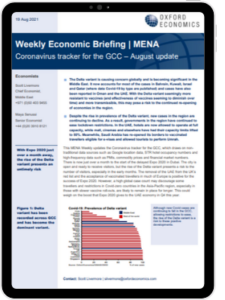MENA | Coronavirus tracker for the GCC – August update

The Delta variant is causing concern globally and is becoming significant in the Middle East. It now accounts for most of the cases in Bahrain, Kuwait, Israel and Qatar (where data Covid-19 by type are published) and cases have also been reported in Oman and the UAE. With the Delta variant seemingly more resistant to vaccines (and effectiveness of vaccines seeming to diminish over time) and more transmissible, this may pose a risk to the continued re-opening of economies in the region.
What you will learn:
- Despite the rise in prevalence of the Delta variant, new cases in the region are continuing to decline.
- As a result, governments in the region have continued to ease lockdown restrictions. In the UAE, hotels are now allowed to operate at full capacity, while mall, cinemas and elsewhere have had their capacity limits lifted to 80%. Meanwhile, Saudi Arabia has re-opened its borders to vaccinated travellers eligible for e-visas and allowed tourists to perform Umrah.
- This MENA Weekly updates the Coronavirus tracker for the GCC, which draws on non-traditional data sources such as Google location data, STR hotel occupancy numbers and high-frequency data such as PMIs, commodity prices and financial market numbers.
Tags:
Related Services

Post
House prices continue to slide for China’s cities
Research Briefing MENA | Coronavirus tracker for the GCC – August update While the property market downturn has been universal, the scale and depth has been varied for different cities and regions.
Find Out More
Post
The Construction Productivity Challenge in Australia
Delve into the state of construction productivity in Australia. Understand the factors affecting growth and how innovation can transform the industry for the better.
Find Out More